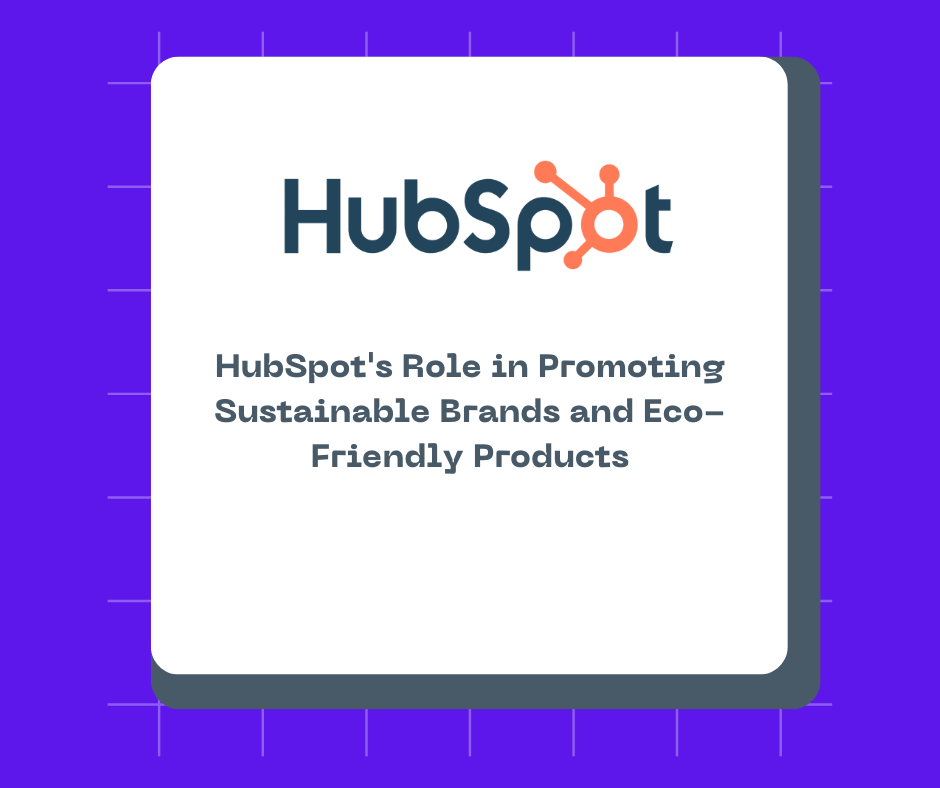In recent years, sustainability has become a critical focus for businesses across industries, driven by growing consumer awareness and concern for environmental issues. As consumers increasingly prioritize sustainability in their purchasing decisions, brands are under pressure to adopt eco-friendly practices and offer sustainable products. HubSpot, a leading CRM and marketing automation platform, plays a crucial role in helping businesses promote sustainable brands and eco-friendly products. In this article, we'll explore the importance of sustainability in today's market, delve into HubSpot's role in promoting sustainable brands, and provide practical tips for leveraging HubSpot to drive sustainability initiatives.
The Importance of Sustainability in Business: Sustainability has emerged as a key consideration for businesses for several reasons:
-
Consumer Demand: Consumers are increasingly seeking out sustainable products and brands that align with their values and beliefs. Surveys show that a significant portion of consumers are willing to pay a premium for eco-friendly products, demonstrating the growing demand for sustainability in the market.
-
Corporate Responsibility: Businesses have a responsibility to minimize their environmental impact and contribute to the well-being of society. Adopting sustainable practices not only helps businesses reduce their carbon footprint but also enhances their reputation and strengthens their relationships with customers and stakeholders.
-
Competitive Advantage: Embracing sustainability can give businesses a competitive edge in the market. Sustainable brands often stand out from their competitors and attract environmentally conscious consumers, leading to increased market share and brand loyalty.
HubSpot's Role in Promoting Sustainable Brands: HubSpot provides businesses with a range of tools and features that can be leveraged to promote sustainable brands and eco-friendly products:
-
Targeted Marketing Campaigns: HubSpot's segmentation and targeting capabilities allow businesses to identify and reach environmentally conscious consumers who are likely to be interested in sustainable products. By creating targeted marketing campaigns that highlight the sustainability features of their products, businesses can effectively reach their target audience and drive engagement.
-
Content Creation and Distribution: HubSpot's content management tools enable businesses to create and distribute content that educates consumers about sustainability issues and promotes eco-friendly products. Whether it's blog posts, social media posts, or email newsletters, businesses can use HubSpot to raise awareness about sustainability and position themselves as leaders in the field.
-
Lead Nurturing and Conversion: HubSpot's lead nurturing workflows allow businesses to engage with leads at every stage of the buyer's journey and provide them with valuable information about sustainable products. By nurturing leads with relevant content and offers, businesses can guide them towards making a purchase decision and converting them into loyal customers.
-
Analytics and Reporting: HubSpot's reporting and analytics tools provide businesses with valuable insights into the performance of their sustainability initiatives. By tracking key metrics such as website traffic, engagement rates, and conversion rates, businesses can measure the impact of their sustainability efforts and make data-driven decisions to optimize their strategies.
Practical Tips for Leveraging HubSpot to Drive Sustainability Initiatives: To maximize the effectiveness of HubSpot in promoting sustainable brands and eco-friendly products, businesses can follow these practical tips:
-
Highlight Sustainability Features: When creating marketing campaigns and content, emphasize the sustainability features of your products, such as recyclable materials, energy efficiency, and carbon footprint reduction. Use HubSpot's content management tools to showcase these features in a compelling and informative way.
-
Educate Consumers: Use HubSpot's email marketing and automation tools to educate consumers about sustainability issues and the benefits of choosing eco-friendly products. Provide tips and resources for living a more sustainable lifestyle and encourage consumers to make environmentally conscious choices.
-
Collaborate with Influencers: Partner with influencers and sustainability advocates who can help amplify your message and reach a broader audience. Use HubSpot's CRM platform to manage relationships with influencers and track the effectiveness of influencer marketing campaigns.
-
Offer Incentives: Encourage consumers to choose eco-friendly products by offering incentives such as discounts, promotions, or loyalty rewards. Use HubSpot's lead nurturing workflows to deliver personalized offers and incentives to leads who have shown interest in sustainability-related content.
-
Measure and Optimize: Continuously monitor the performance of your sustainability initiatives using HubSpot's reporting and analytics tools. Track key metrics such as engagement rates, conversion rates, and customer satisfaction scores, and use this data to identify areas for improvement and optimize your strategies accordingly.
Real-World Examples of Successful Sustainability Initiatives: Many businesses have successfully leveraged HubSpot to drive sustainability initiatives and promote eco-friendly products. Here are a few real-world examples:
-
A clothing retailer uses HubSpot's targeting capabilities to create personalized marketing campaigns that highlight the sustainability features of its products, such as organic cotton and fair trade practices. By targeting environmentally conscious consumers with relevant messaging, the retailer has seen an increase in sales and brand loyalty.
-
A beauty brand partners with sustainability influencers to create educational content about eco-friendly beauty products and sustainable packaging. Using HubSpot's content management tools, the brand distributes this content through blog posts, social media, and email newsletters, raising awareness about sustainability issues and driving engagement with its target audience.
-
A food company launches a sustainability-focused email marketing campaign to promote its line of organic and locally sourced products. Using HubSpot's lead nurturing workflows, the company delivers personalized email messages to leads who have expressed interest in sustainability-related content, driving traffic to its website and increasing sales of its eco-friendly products.
Conclusion: HubSpot plays a vital role in helping businesses promote sustainable brands and eco-friendly products. By leveraging HubSpot's marketing automation, targeting, content management, and analytics tools, businesses can effectively reach environmentally conscious consumers, raise awareness about sustainability issues, and drive engagement with their sustainability initiatives. Whether it's highlighting the sustainability features of products, educating consumers about sustainability, or offering incentives to choose eco-friendly options, HubSpot provides businesses with the capabilities they need to drive positive change and make a meaningful impact on the environment. Embrace the power of HubSpot to promote sustainability and contribute to a more eco-friendly future.
Schedule your training session here and comment “Need Training” on the request form.

Comments